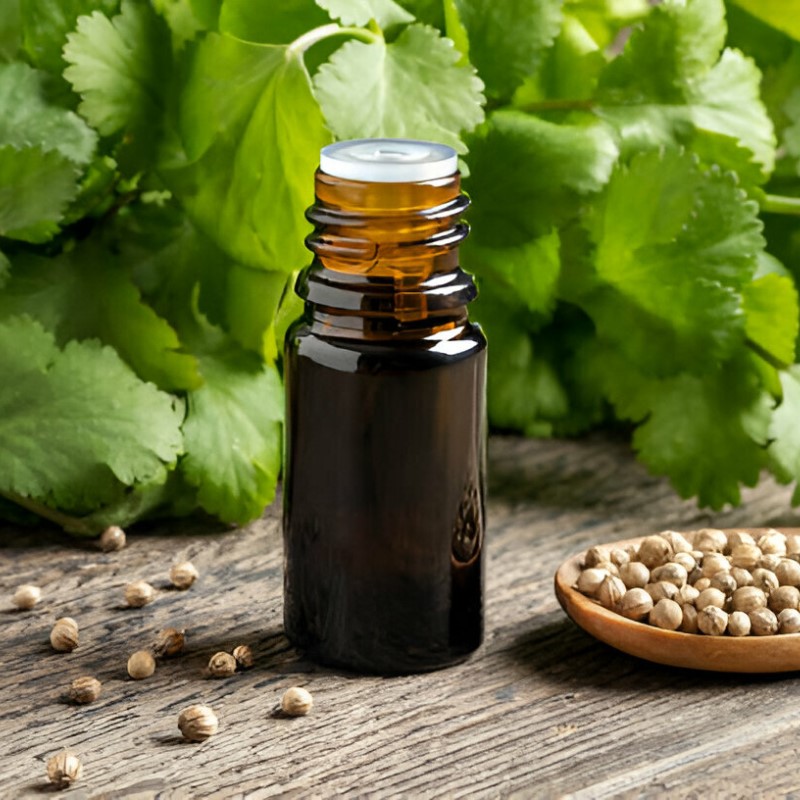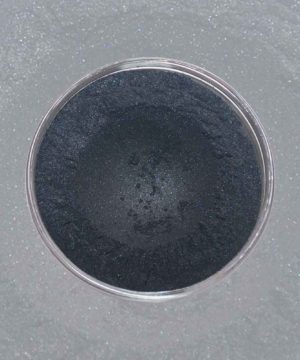What is Coriander Essential Oil?
Coriander essential oil is extracted from the seeds of the plant Coriandrum sativum, which belongs to the umbellifer family (Apiaceae). The leaves of the plant are known worldwide as coriander or cilantro, but it is the seeds that are used to produce this essential oil. The oil is known for its warm, spicy and slightly sweet fragrance reminiscent of citrus with earthy undertones. The scent is pleasant and versatile, which makes it popular in both aromatherapy and perfumery.
By steam distillation, the active ingredients are extracted from the seeds. The result is a clear to pale yellow oil with a complex chemical composition rich in linalool, a substance with soothing and anti-inflammatory properties.
Chemical Composition and Properties
The main chemical component in coriander essential oil is linalool, which can account for between 60% and 80% of the oil. Other active compounds include α-pinene, γ-terpinene, camphor and borneol. These compounds contribute to the antimicrobial, antioxidant, anti-inflammatory and soothing properties of the oil.
Linalool is particularly well known for its relaxing and anxiety-reducing effects. It is often studied in the context of stress reduction and improving sleep quality. In addition, coriander oil also has antiseptic properties, making it valuable for skin care.
Traditional Use
Coriander has been in use as a kitchen herb and medicinal plant since ancient times. Ancient Ayurvedic and Chinese writings mention coriander seed as a remedy for digestive complaints, bloating, flatulence and even as an aphrodisiac. The essential oil, although a modern application, carries on this traditional reputation.
In folk medicine, coriander oil was often used for muscle pain, rheumatic complaints, colds and insomnia. Coriander was also used in cleansing the body of toxins, due to its suspected detox effects on liver and kidneys.
Applications in Aromatherapy
In aromatherapy, coriander essential oil is used to support both body and mind. The scent has an uplifting effect without being over-stimulating. This makes it an excellent choice for mental fatigue, stress and anxiety.
A few drops of coriander oil in a diffuser can create a warm and inviting atmosphere, ideal for evening relaxation or during meditation. The fragrance also comes into its own when combined with other oils – such as bergamot, lavender or cedarwood.
For massage, the oil can be diluted with a carrier oil such as jojoba or almond oil. This helps relieve muscle pain, promotes circulation and has a warming effect on the body.
Skin Care and Cosmetics
Thanks to its antiseptic and anti-inflammatory properties, coriander essential oil is also a valuable addition to skin care products. It can help soothe irritated skin, reduce redness and fight bacteria that cause acne.
However, the oil should never be applied purely to the skin. Always dilute first in a carrier oil or a product intended for that purpose, such as a face cream, lotion or serum. For people with sensitive skin, an allergy test is recommended before using coriander oil.
In cosmetics, coriander oil is also valued for its unique fragrance. It adds a warm, spicy touch to perfumes, soaps, deodorants and bath products.
Emotional and Mental Support
The warm scent of coriander oil has a grounding and balancing effect on the mind. It is often used for feelings of nervousness, insecurity and mental exhaustion. Some aromatherapists even describe coriander oil as an “oil of self-confidence” – one that helps you look at challenges with more calmness and clarity.
In periods of burnout or overwork, coriander oil can help to regain inner peace. It is also often combined in this context with other calming oils such as frankincense, creamy chamomile or vetiver.
Combinations with Other Essential Oils
Coriander essential oil blends well with a wide range of other essential oils, making it a popular choice in perfumes and aromatic blends. Here are some suggestions for combinations:
-
Lavender: enhances the relaxing effect, ideal for bedtime
-
Orange or bergamot: for an uplifting and sunny fragrance composition
-
Cedarwood: adds an earthy, warm base note
-
Peppermint: for a fresh, energizing boost for mental fatigue
-
Ginger or cinnamon: for a warming massage oil for sore muscles
Application in Soap and Fragrances
Coriander essential oil is an excellent addition to artisanal and natural soaps. With its warm, spicy and slightly citrusy fragrance, it adds a sophisticated and aromatic character to soap formulations. The scent is complex and layered, making it a good fit in both fresh and spicy soap blends.
In fragrance terms, coriander essential oil has the following notes:
-
Top note: fresh, citrusy, slightly sweet – a bright opening
-
Heart note: spicy, green, slightly earthy – gives depth and character
-
Base note (mild): a soft, warm spiciness that lingers
These properties make coriander oil ideal for soaps with a unique botanical or spicy scent, often combined with other essential oils such as:
-
Lemon or lime – for fresh, energetic soaps
-
Cedarwood or patchouli – for a warm, earthy blend
-
Lavender – for a relaxing, balanced aroma
In addition to fragrance, coriander oil also contributes to the skin-care properties of soap. Thanks to its antibacterial and anti-inflammatory properties, it helps cleanse the skin without irritating it. This makes it suitable for facial soaps, body soaps and even shaving soaps.
A dosage of 0.5% to 2% of the total oil mixture in a soap recipe is common, depending on the desired fragrance strength. As with all essential oils, test on a small scale first and always consider IFRA guidelines.
Alpha-Bisabolol, also known as Levomenol, is a natural active extracted mainly from the essential oil of Matricaria chamomilla (chamomile) and the Candeia tree(Vanillosmopsis erythropappa). It has soothing and anti-inflammatory properties and is widely used in cosmetic products.
Use in Cosmetics
Alpha-Bisabolol is often used in skin care products because of the following benefits:
- Calming effect on the skin
- Reduces redness and irritation
- Supports wound healing
- Antibacterial and anti-inflammatory properties
- Improves absorption of other active ingredients
It is often added to creams, serums, lotions, lip balms, after-sun products and baby care.
Use in Soap
Alpha-Bisabolol is used in soap to soften and calm the skin. It helps to reduce irritations and makes soap suitable for sensitive skin. Due to its antibacterial properties, it can contribute to cleaner and healthier skin. It is often added to handmade and natural soaps to provide extra care.
Provenance
Alpha-Bisabolol occurs naturally in plants such as chamomile and the candeia tree from Brazil. The synthetic version of this substance is also produced commercially and offers an environmentally friendly alternative to the natural variety.
Quantity Use
In cosmetic formulations, Alpha-Bisabolol is usually used at concentrations of 0.1% to 1%. Higher concentrations may be used in specialized products, depending on the desired effect.
Benefits for the Skin
This substance is particularly effective for sensitive, dry and irritated skin. It helps with:
- Reducing itching and irritation
- Repairing a damaged skin barrier
- Improving skin texture
- Reducing signs of aging
| Feature | Description |
|---|---|
| Botanical name | Coriandrum sativum |
| INCI Name | Coriandrum Sativum Seed Oil |
| CAS number | 8008-52-4 / 84775-50-8 |
| EINECS number | 283-880-0 |
| HS code | 3301.29.41 (Essential oils, unspecified, coriander) |
| Part of the plant | Dried seeds |
| Extraction method | Steam distillation |
| Origin | Grown worldwide – including India, Russia, Egypt, Bulgaria |
| Color | Bright to light yellow |
| Fragrance Profile | Warm, spicy, slightly citrusy, nutty |
| Top note | Citrusy, fresh |
| Heart note | Spicy, green, mildly earthy |
| Base note | Soft spicy, slightly warm |
| Main ingredient | Linalool (approx. 60-80%) |
| Major Components | α-Pinene, Camphor, γ-Terpinene, Borneol |
| Density (20°C) | ± 0.860 – 0.890 g/cm³ |
| Refractive index (20°C) | ± 1.460 – 1.480 |
| Flashpoint (flash point) | ± 58-62 °C |
| Solubility | Soluble in alcohol and oil, insoluble in water |
| IFRA status | Limited use by product category – see current IFRA guideline |
| Application in aromatherapy | Stress relief, calming, mental clarity |
| Application on skin | Acne, inflammation, redness (use diluted only) |
| Application in soap | Fragrance component, skin conditioning, antibacterial |
| Compatible essential oils | Lavender, cedarwood, bergamot, lime, patchouli, ginger |
| Use in perfumery | Heart to top note in fresh and spicy perfumes |
| Allergen information | Contains naturally occurring allergens such as linalool |
| Safety & Warnings. | Dilute for skin use, avoid in pregnancy, allergy test recommended |







Reviews
There are no reviews yet.